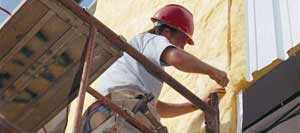Building Insulator
Tasks & duties

Building insulators may do some or all of the following:
-
study building or equipment plans and quotes
-
advise clients on insulation materials suitable for different jobs
-
erect scaffolding, trestles or ladders
-
install heat insulation in ceilings, walls and under floors
-
cut insulation materials to the size required
-
attach insulation materials using glue, staples or tape
-
operate equipment to inject loose fill or foamed insulation
-
repair and maintain existing insulation
-
install insulation for vehicles and boats
-
install hot water cylinder wraps
-
install sound and fireproofing products
-
put draught excluders on doors
-
put draught sealant around doors and windows
-
put security stays on windows
-
sell insulation materials and equipment
-
deal with merchants
Specialisations
Some building insulators specialise in installing certain products such as natural wool. Some may also specialise in certain types of installation processes such as soundproofing.
Skills & knowledge

Building insulators need to have:
-
knowledge of different insulation materials and methods
-
the ability to read construction and engineering plans for residential and commercial buildings
-
planning skills for evaluating what insulation materials and equipment will be required to do a specific job
-
maths skills, including how to measure pipes and work out the required amount of insulation materials
-
communication skills
-
problem-solving skills
-
practical skills
-
knowledge of safety procedures
Entry requirements
There are no specific entry requirements to become a building insulator. However, to work on building sites you need to have a Site Safety Passport issued by the Department of Labour.
Secondary education
At least three years of secondary education is recommended to become a building insulator. Useful subjects include woodwork, English and maths.
Training on the job
Skills are gained on the job and some employers may arrange training programmes for their employees. Energy Efficiency and Conservation Authority (EECA) also runs workshops to help train building insulators.
Useful experience
Useful experience for building insulators includes:
-
building construction industry work such as carpentry
-
woodwork
-
installing insulation
-
graphic drawing
Related courses
Painting, Decorating, Sign Writing and Other Finishes
Plastering
For more information, please refer to Career Services.
Document Actions
